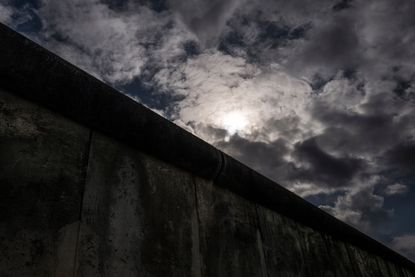Berlin's wall and ours
What that signifier of the Cold War indicates about our unsettled historical moment


Where were you when the wall came down?
The question is prompted by the news that the Berlin Wall has now been down for longer than it had been up in the first place. A cruel and ugly signifier of the Cold War, an admission on the part of the German Democratic Republic that its version of socialism had become a literal prison, the wall was a boundary in time as well as space. You could deface it, decorate it, defy it, demand that it be torn down. But while it still stood, it defined the age.
And when it fell, the age lost its definition.
Subscribe to The Week
Escape your echo chamber. Get the facts behind the news, plus analysis from multiple perspectives.

Sign up for The Week's Free Newsletters
From our morning news briefing to a weekly Good News Newsletter, get the best of The Week delivered directly to your inbox.
From our morning news briefing to a weekly Good News Newsletter, get the best of The Week delivered directly to your inbox.
Personally, in the fall of 1989 I was in college, in America, just finishing up a course titled Comparative Socialist Politics, which was actually about the politics of Eastern Europe: Poland, Hungary, Czechoslovakia, and non-aligned Yugoslavia (which was the professor's particular area of expertise). In the first session after Nov. 9, we all sat around wondering whether we'd just wasted a semester.
By 1991, when Yugoslavia collapsed into war, it was obvious that the course I had taken would prove only too useful in understanding the world aborning. But what that world is, and how we should talk about it, remains obscure, almost 30 years on. We don't really know what times we are living in.
Is that strange? Not necessarily. The period after World War I was another uncentered and uncertain era: In Germany and Russia (and in the Balkans and the Middle East), the pre-war order had been overturned, but what replaced it was violently changeable; in France and Britain, continuity barely masked a pervasive sense of hollowness. It was only with the rise of fascism in the 1930s, and really only with fascism's defeat in World War II, that the interwar period came to be defined as such — which is to say, defined by its very in-betweenness.
Similar things have been said about the restorationist periods in French and British history, after the defeat of Napoleon and the end of Cromwell's interregnum respectively. These assessments are made retrospectively, but they were also felt at the time, reflected in the era's art and letters.
We make our stabs at orienting ourselves nonetheless, because we have no choice. Without a future to aim for, much of the activity of modern life, particularly at the elite levels of business and government, cannot even get started. And we inevitably aim for a future oriented by our understanding of the past. The project of European integration, for example, was appealing to such a large swathe of the European population — and a much larger percentage of the elite — not only because of the promised material benefits, but because it gave meaning and direction to a defining event of their lives, the end of Europe's division. If most of those in the formerly captive nations of the east didn't see it that way at all — and saw liberation from foreign domination as more fundamental than vindication of liberal principles of government — then perhaps they just needed time — or a bit of encouragement — to catch up.
Similarly, the aftermath of 9/11 provided a context for understanding our new era in America. History had taken a holiday for a decade, but now history was back, and those in power knew what it took to meet its challenge: a girding of our loins for battle, and a reaffirmed commitment to the universal appeal of democracy and freedom that had proven victorious in our last two great conflicts. Once again America would lead the free West against a violent and tyrannical revolutionary doctrine, and would triumph.
Both in practical terms and on the level of ideological conviction, neither project is doing especially well these days. In the wake of the financial crisis, the fundamental inequities and lack of democratic accountability in Europe were laid bare. Meanwhile, the manifest failure of America's democratization project in the Middle East dramatically accelerated a global refugee crisis that has put European institutions under even greater strain.
The unraveling of both projects has much to do with the ructions of our political era, the vote for Brexit and the election of Trump, and the rise of the populist right across the West. But those responses themselves have a distinctly negative, defensive and ill-defined character. No alternative future for Britain animated the vote for Brexit; no alternative future for Poland animates its government's determination to uphold a myth of national innocence by legal fiat; and in Trump's America, greatness consists primarily in insisting over and over again how great we are. The fragility of our Gesellschaft has sent us scurrying for a politics of Gemeinschaft, only to discover that the latter cupboard is even emptier than the former. We demand walls, saying it is to keep others out, but really to remind ourselves that where we are is a place one can be "in."
The summer after I took that course on Eastern Bloc politics, I went to Europe, to Prague and then to Berlin, to breathe for myself the newly liberated air. Much of the wall was still up, but there were holes everywhere, and in some places it had been removed entirely. One of these was the Potsdamer Platz, where I came upon an anarchist encampment. A squatters' settlement had been founded many years earlier in a peculiar no-man's land, a sliver of East German territory that had wound up on the West German side of the wall. The wall kept the East German police away, but the West German police couldn't approach them without causing an international incident, and so their collection of filthy tents stood unmolested by either side.
By the time I met them, the wall they leaned against had been torn down, and plans were already underway for massive redevelopment. But the tent-dwellers hadn't moved on, had no idea, really, what their next move might be. They were just waiting for the larger forces around them to gather sufficient strength to sweep them away, into the dustbin of history.
Create an account with the same email registered to your subscription to unlock access.
Sign up for Today's Best Articles in your inbox
A free daily email with the biggest news stories of the day – and the best features from TheWeek.com
Noah Millman is a screenwriter and filmmaker, a political columnist and a critic. From 2012 through 2017 he was a senior editor and featured blogger at The American Conservative. His work has also appeared in The New York Times Book Review, Politico, USA Today, The New Republic, The Weekly Standard, Foreign Policy, Modern Age, First Things, and the Jewish Review of Books, among other publications. Noah lives in Brooklyn with his wife and son.
-
 The week's best photos
The week's best photosIn Pictures Playful goslings, an exploding snowman, and more
By Anahi Valenzuela, The Week US Published
-
 What is rock flour and how can it help to fight climate change?
What is rock flour and how can it help to fight climate change?The Explainer Glacier dust to the rescue
By Devika Rao, The Week US Published
-
 Crossword: April 19, 2024
Crossword: April 19, 2024The Week's daily crossword puzzle
By The Week Staff Published
-
 Puffed rice and yoga: inside the collapsed tunnel where Indian workers await rescue
Puffed rice and yoga: inside the collapsed tunnel where Indian workers await rescueSpeed Read Workers trapped in collapsed tunnel are suffering from dysentery and anxiety over their rescue
By Sorcha Bradley, The Week UK Published
-
 Gaza hospital blast: What the video evidence shows about who's to blame
Gaza hospital blast: What the video evidence shows about who's to blameSpeed Read Nobody wants to take responsibility for the deadly explosion in the courtyard of Gaza's al-Ahli Hospital. Roll the tape.
By Peter Weber, The Week US Published
-
 Giraffe poo seized after woman wanted to use it to make a necklace
Giraffe poo seized after woman wanted to use it to make a necklaceTall Tales And other stories from the stranger side of life
By Chas Newkey-Burden, The Week UK Published
-
 Helicopter sound arouses crocodiles
Helicopter sound arouses crocodilesTall Tales And other stories from the stranger side of life
By Chas Newkey-Burden, The Week UK Published
-
 Woman sues Disney over 'injurious wedgie'
Woman sues Disney over 'injurious wedgie'Tall Tales And other stories from the stranger side of life
By Chas Newkey-Burden, The Week UK Published
-
 Emotional support alligator turned away from baseball stadium
Emotional support alligator turned away from baseball stadiumTall Tales And other stories from the stranger side of life
By Chas Newkey-Burden, The Week UK Published
-
 Europe's oldest shoes found in Spanish caves
Europe's oldest shoes found in Spanish cavesTall Tales And other stories from the stranger side of life
By Chas Newkey-Burden, The Week UK Published
-
 Artworks stolen by Nazis returned to heirs of cabaret performer
Artworks stolen by Nazis returned to heirs of cabaret performerIt wasn't all bad Good news stories from the past seven days
By The Week Staff Published